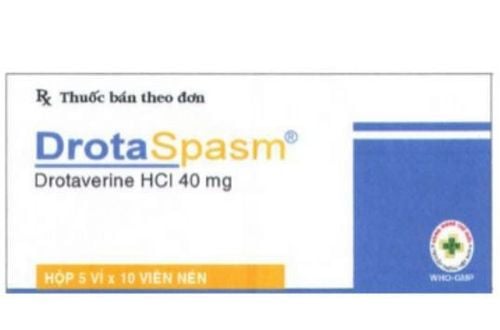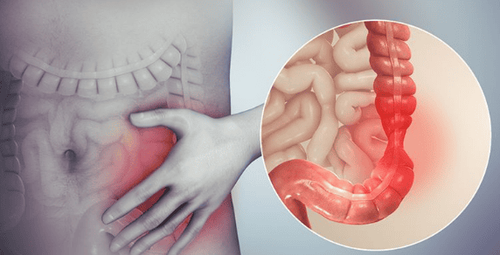This is an automatically translated article.
Some smooth muscle inhibitors such as spasmaverine, phloroglucinol are used in the treatment of colon spasms. However, when using these drugs, patients need to be aware of some side effects of the drug. Refer to the article below to get more useful information about this colon spasm medication.1. What is colon spasm?
Colonic spasm is a condition in which the colon occurs abnormally and dysfunctionally, causing the patient to appear with abdominal cramps, severe abdominal pain.
For spastic colon disease, the treatment will depend on the cause of the pain and symptoms that the patient is experiencing. In which, the symptoms of colon spasms are usually focused mainly on the digestive system. Common types of symptoms are: First, abdominal pain with diarrhea, secondly abdominal pain with symptoms of constipation and constipation with diarrhea.
2. Some drugs for colon spasms
The drugs used to treat colon spasms commonly used today include:
2.1. Smooth Muscle Inhibitors Smooth muscle inhibitors are used to relieve painful spasms of the colon, such as phloroglucinol and spasmaverin. In which:
Phloroglucinol with direct antispasmodic effect on smooth muscle should be used in the treatment of colon spasms. Phloroglucinol is used with dosage: 80mg tablets, 2 tablets / time when pain, taking no more than 6 tablets a day. Solution for injection, 1-3 ampoules/day, intravenously or intramuscularly. Suppositories use 150mg dose, maximum 3 tablets per day, spaced at least 2 hours apart. When using Phloroglucinol may appear some side effects such as: allergic urticaria , rash, Quincke edema, for injection form can sometimes cause hypotension. Spasmaverine is a drug indicated in the treatment of gastrointestinal smooth muscle spasms, urinary tract, pain relief due to spasms. The dose of Spasmaverine is from 60-120mg, taken 1-3 times a day. Note that Spasmaverine should not be used by pregnant or lactating women as well as people with low blood pressure. In addition, during the course of taking the drug, the patient may appear some unwanted effects such as: allergic urticaria, headache, dizziness, laryngoedema, more severe can lead to shock when allergic heavy. 2.2. Drugs used for flatulence, abdominal distension For symptoms of flatulence, abdominal distension, the drugs used include: Trimebutine, domperidone.
In which, Trimebutine has the effect of regulating intestinal motility in the stomach as well as preventing colon spasms thanks to the mechanism of action on the nervous system with the function of regulating gastrointestinal activity on the mucosa of the stomach. . The usual dose for adults is 300mg/day, 100mg 3 times a day, for 3 to 7 days. For children, the usual dose is 5ml/5kg/day. During the use of Trimebutine, patients may appear some side effects such as bad breath and dry mouth, diarrhea, nausea, fatigue, or dizziness, drowsiness, allergic rash, edema, ... As for Domperidone, although it is a commonly used drug in the treatment of spasmodic colon, in France and some European countries has stopped using it when the drug appears to have many side effects such as increased risk of ventricular arrhythmias and high blood pressure. moreover, sudden death. Dosage of domperidone for adults is 10-20mg x 3 times/day. In addition, some digestive enzymes, especially those taken from the pancreatic juice of pigs and cows or drugs containing activated charcoal such as Carbophos, Sorbitol, Motilium-M,... can also help relieve symptoms. stomach bloating.
2.3. Drugs to treat loose and broken stools... There are 2 drugs commonly used to treat symptoms of loose stools in spasmodic colitis, including: Loperamide and smectite intergrade
Loperamide drugs have an effect. reduces intestinal motility, reduces secretions and increases the tone of spasms in the anus. In addition, loperamide slows the movement of food through the intestines, helping the body absorb more fluids. When using Loperamide, patients should pay attention to some possible side effects such as constipation, dry mouth accompanied by nausea. Pregnant and lactating women should consult a doctor before use, and people with constipation should not use this medicine. Like Loperamide, Smectite intergrade is used in the treatment of spasmodic colonic symptoms with loose stools, with the effect of helping to increase the tolerance of the gel on the digestive mucosa, thereby helping to coat the mucosa. desert. When using smectite intergrade can cause some side effects such as gas, constipation, vomiting and nausea.
3. Using drugs to treat spasms of the colon, what should the patient pay attention to?
When using drugs to treat colon spasms, people should note the following:
3.1. When using drugs to treat spasms of the colon, patients should pay attention to consult their doctor before use, especially sensitive subjects such as: pregnant women, patients with impaired liver and kidney function and children under 12 years old.
In addition, compliance with the correct dosage prescribed by the doctor also plays an important role. If used in the wrong dosage, patients can appear many side effects that greatly affect health.
The drugs used in the treatment of colon spasms all contain some side effects such as rashes, allergies, nausea, headaches, etc. Therefore, when abnormal symptoms appear, the patient needs to be careful. Stop using the drug and immediately notify the treating doctor for advice and timely intervention.
3.2. Changing diet and activities Besides the use of drugs, diet and activities play a big role in the treatment of colon spasms, especially this disease is easy to recur. In the process of eating and living, the patient should:
Avoid using beverages that affect the digestive system such as alcohol, carbonated soft drinks, stimulants. Do not eat foods that are too greasy or hot. Eat cooked and drink hot, avoid using raw and unprocessed foods. Full complement of nutrients good for the digestive system including probiotics (containing beneficial bacteria for the digestive system) found in fermented foods, yogurt,... Avoid Overeating or skipping meals, can make the condition worse. For full information about antispasmodic drugs as well as treatment methods, readers can contact their doctors. has a high level of expertise from Vinmec International General Hospital.
Please dial HOTLINE for more information or register for an appointment HERE. Download MyVinmec app to make appointments faster and to manage your bookings easily.













